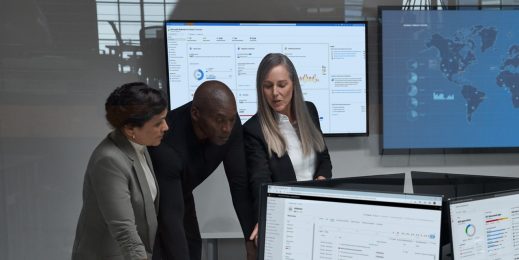
Digital Transformation
Regtech meets Fintech; Perpetual and Microsoft transform the finance sector
A cloud-based data analytics platform that is designed to provide fine-grained analysis of the mortgage market is being rolled out to help manage risk across the financial sector, and provide earlier alerts of emerging problems.
Richard McCarthy, general manager of sales and product for Perpetual Corporate Trust – who worked with Microsoft to develop the new platform – explains that it’s now possible for organisations to stress test their residential mortgage portfolio using macroeconomic factors such as house price indexes, GDP, unemployment and the cash rate. This lets them perform ‘what if’ analysis – giving an understanding of their mortgage performance four years into the future1.
Mortgage stress was considered one of the underlying factors that contributed to the Global Financial Crisis – and since then regulators around the world have required financial institutions to stress test their loan portfolios and maintain prudent capital reserves.
The Australian Prudential Regulatory Authority (APRA) for example, has intensified its scrutiny of mortgage lending practices and established benchmarks for local institutions regarding loan serviceability and investor lending portfolio growth.
Lenders have of course always analysed their mortgage portfolios – but it has been a largely manual and somewhat cumbersome process. McCarthy explains, “A lot of it was actually done by big project teams with an advisor, working with spreadsheets and pulling together the analysis. A lot of project time and cost is involved in actually putting together the stress-test requirements.”
It’s that process that Perpetual has digitally transformed, creating a platform allowing fine grained insight – even down to postcodes on private deals– allowing lenders to nimbly respond to shifting conditions.
McCarthy is quick to point out that the service alone won’t reduce risk – but the insights that the service provides should support far more effective risk management across the financial sector.
Perpetual Corporate Trust is a leading provider of corporate trustee services to Australia’s banks, large financial institutions and non-bank lenders. Assisting the sector with risk, compliance and reporting issues means Perpetual has collected 20 years of mortgage data and is now using cloud computing and analytics to unlock the value in that treasure trove of information.
ABSPerpetual Business Intelligence leverages that database of detailed mortgage information, and allows individual institutions to compare the data in their own core banking systems against that in a form of benchmarking. Besides its 20 years of historical data Perpetual also sources macroeconomic data feeds from the both the Australian Bureau of Statistics and Core Logic which allows the impact of the broader economy to be explored.
Working with Deloitte, Perpetual has used historical data from these sources to craft highly effective credit modelling algorithms.
The service is based on Microsoft Azure, and uses the Cortana Intelligence Suite and Power BI to make the insights easily accessible, while Azure’s machine learning capabilities ensures the algorithm is continually enhanced and refined.
The digital partnership between Perpetual and Microsoft has been key to the success of the programme, with the dynamism and agility of Azure allowing Perpetual to test, learn, spin up sandboxes, and then get a proof of concept out to clients for testing and feedback.
The feedback from the market utilising the Power BI application has just been astounding. It’s been so well received; we’re very, very happy in terms of how we partner with Microsoft to bring this strategy to risk. Some people have said it’s fintech meets regtech, which is quite cool.
– McCarthy
For the end user the platform makes mortgage portfolios genuinely transparent. McCarthy explains; “This begins in terms of visualisation and really understanding, at the click of a button, “How is my mortgage portfolio performing?” whether nationally, by state or by postcode, and then easily compare that against the market. We have about $60-130 billion worth of mortgages in the public securitisation market in any given year, which clients can basically compare on a like-for-like basis (to see) how their portfolio is performing. So that can really start informing not just your regulatory reporting, but it can also start informing credit strategy, inform your risk strategy and potentially it could even inform your lending strategy, because you can really understand the pockets of risk very, very quickly. You can understand, “Okay, why are we lending in that area?” or, “What’s our strategy for that region given potential risk factors playing into those postcodes or lending areas?”
“So I think it’s very much the start of the journey rather than the end, and I think we’re just going to build and develop the platform with the market’s needs at the front and centre, to enable us to make sure we continue to develop product which meets our clients’ needs.”
To streamline the process for financial institutions Perpetual securely takes the data from a bank’s core banking platforms, runs it through a validation engine to ensure that it will be comparing like-for-like, stores that data securely in Azure, then uses Cortana Intelligence Suite to perform the analysis and Power BI to visualise and annualise the outcomes and display them for the end user in an easy-to-understand format.
The availability of an Australian domiciled, secure and trusted Azure instance was essential for the success of the project, which needs to meet market expectations regarding data privacy and security.
For the end user the benefits are significant.
“The technology can basically take unemployment stress and, at the click of a button. Because we’ve got 20 years of history, we’ve analysed what the interrelation is with the cash rate and with house prices and with GDP. So you can stress one factor, like unemployment, and the rest of the factors will interrelate how they performed over the period of time.
“You can even setting up your rate of stress, whether it’s a cash rate stress, GDP stress, a house pricing stress or unemployment stress, and once you’ve selected what your stress type is, it analyses your entire mortgage portfolio to those stress scenarios and then gives you the predictive power to analyse what the likely outputs are for probability of default, loss-given default, exposure at default and then an expected loss calculation. And when you get to that level, you’re actually putting a dollar value on expected loss, which really helps support banks’ position around how much capital they need to ensure that they retain to manage that in a high-stress environment so they can pay off those potential losses in the future.”
To ensure that the platform maintains its currency Perpetual is planning to run an annual machine learning exercise using Azure’s artificial intelligence capabilities to test and refine the predictive modelling and credit modelling capabilities of the platform.
Besides providing the opportunity for greater transparency for its financial sector clients, McCarthy says that the service should help strip out costs from projects, operational, risk and compliance functions.
“Thirty banks have the same regulatory requirement, and each of the 30 banks would have an advisor, have a project team, an operations team, a data science team, a data analysts team, to even just build the models to give you the output. What we’re trying to do is really create huge efficiency so clients actually can analyse their business at the click of a button, rather than going through that costly exercise of actually getting to these models and algorithms,” required both for operational and compliance purposes.
Armed with that insight institutions will also be able to work with Perpetual to customise the service they receive, based on their unique risk model.
“The digital platform, would provide them with the outputs and the analysis to actually slice and dice that risk by those dimensions, like loan, property and borrower dimensions, to really understand what is that future risk of the portfolio given a high-stressed environment,” says McCarthy.
The service could also help level the financial sector playing field for smaller institutions which have not attained APRA advanced accredited status. The major banks are able to establish with APRA the amount of capital they need based on sophisticated internal modelling of their portfolios, ?called advanced accreditation.
Smaller banks have not had access to that level of modelling and have instead been bound by standards which may require them to hold more risk credit capital against a mortgage, which has in some cases hampered their ability to compete on rates.
McCarthy believes; “There are potential opportunities for banks to use this digital platform to support their journey towards getting advanced accreditation to make them even more competitive in the market.”
Perpetual is also looking over the horizon to determine how emerging technologies might deliver even greater impact. McCarthy said that applying bots could allow more natural interrogation of data.
If there were floods in a particular region for example; “You could literally just type in, “This post code, what’s my exposure?” So you can start using a Q&A, and then potentially use bots. We’re in discussions with Microsoft around the new NOW UI, so that’s pretty cool.”
“We’re literally on a leading edge now with Microsoft: we’re working very heavily in terms of the machine learning exercises, AI, looking at bots, we’re looking at the UI. With Microsoft we can literally be on the crest of their wave in terms of when they bring their products to market; our platform continually develops and is the most innovative platform here and therefore our clients get the benefits of that.”
McCarthy also believes that the platform can be leveraged in further ways. “We can really catapult this into the future, creating more efficiency and more effective visualisations and analysis from the core data.
“The banks can already see the power of the platform and what it can deliver today, but also potentially what it could deliver to them tomorrow. And I think that’s where it becomes very, very exciting, where the clients are already saying, “Okay, well, how do I improve my board reports?”
“Because it’s so visual, it’s very insightful; a picture tells a thousand words,” allowing institutions to share insights internally and also with investors and clients shaping both lending strategies and investment decisions.
Already operating on a 30-day release cycle, McCarthy says; “We can continue to develop the platform at a much lower cost because we can provide development once rather than 30 banks doing it 30 times. So we really think we can create this new ecosystem for the industry – for the betterment of the industry.”














